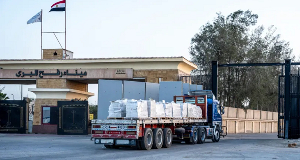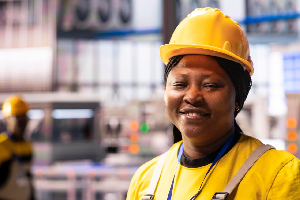Ghana’s smooth transitions in leadership, even under challenging circumstances like the down-to-the-wire presidential election of 2008 or the passing earlier this year of President John Atta Mills, are often cited as evidence of the maturity of the country’s democratic politics. While this is indeed true and Ghanaians have every right to be proud of the respect for constitutional order that in recent years has distinguished the country’s leaders from, sadly, all-too-many of their counterparts in the sub-region and, indeed, across Africa, I would submit that just as momentous a blow for the rule of law was struck just this past week in the Commercial Court in Accra—if the judgement allowed to stand.
From his a modest, but dignified chambers, Mr. Justice Richard Adjei Frimpong issued a ruling last Thursday upholding his earlier order detaining an Argentine naval vessel in Tema Port as part of a debt dispute between the Latin American country and its commercial creditors. The significance of the judge’s 25-page decision, however, extends well beyond the immediate issue of whether or not the ARA Libertad can sail away without posting adequate bond to larger questions concerning the state of legality in Ghana and the relationship which the country and other developing nations have with the international financial system and the rules which undergird it.
Ever since authorities detained the Argentinian tall ship two weeks ago, too much of the discourse about the incident has unfortunately taken its cue from the angry reaction of the Foreign Ministry spokesman in Buenos Aires who denounced the action as that of “vulture funds” and “speculators” who had “crossed a new limit” in their “extortion.” The Argentine diplomat’s rather rude insinuation—one repeated by a Defence Ministry official last week following Mr. Justice Adjei Frimpong’s decision—was that the Republic of Ghana is somehow a dupe, if not a stooge, of malevolent financial predators from America and Europe.
I think there is another, more likely, explanation, one which is much more consonant with what I know of Ghana’s people, their government, and the country’s history. In 1990, Ghana ranked thirtieth from the bottom on the United Nations Development Program’s inaugural Human Development Index. Ghanaians, realizing that drastic action was needed to turn the country’s direction around, restored constitutional order and multiparty, democratic politics in 1992. In recent years, generally sound macroeconomic policy combined with high prices for gold and cocoa have delivered a consistently strong growth rate over the last two decades—last year’s stellar 13.6 per cent real growth rate in GDP made Ghana the fourth fastest growing economy in the world—greatly reducing the proportion of the population living in poverty. With production well underway in its offshore petroleum fields, it is not unreasonable to envision Ghana rapidly ascending the ranks of middle-income countries, notwithstanding the challenges which remain.
Ghanaians know that progress has not always been easy and that critical to their country’s success has been its commitment rule of law and fiscal probity, two conditions without which the global capital would have bypassed the country irrespective of its natural endowment. What made the country attractive for investment was that it offered potential partners a legally binding assurance that any money they advanced, whether through loans or investments, would be repaid and a credible judicial remedy was available in the event that things went awry; having provided for these two necessities, it is no wonder that Ghana brought in nearly $8 billion in foreign direct investment (FDI) last year.
In contrast, Argentina—a regional power in its South American neighbourhood with twice the population, twelve times the GDP, and eight times the foreign exchange reserves of Ghana (more than enough to pay off its overdue debts many times over)—received just $7.2 billion in FDI last year. This sharp contrast is understandable when one considers that Buenos Aires has been something of a deadbeat with its obligations since it underwent the largest default in history in 2001, one involving some $100 billion in bonds.
Much of the bad debt was held by old-age pensioners in Germany, Italy, Spain, and other countries who were in no position to contest the stingy terms dictated to them by the Argentine government when it unilaterally swapped the defaulted bonds for still more bonds at a much reduced nominal value which, in most cases, gave the elderly with only the tiniest fraction of what they had invested. However, a small, but persistent, group of investors have insisted on full repayment of the money owed to them. These holdout creditors have won more than one hundred court judgments against Argentina in courts around the world, including rulings in the British Supreme Court and the American federal courts.
Despite these legal victories, however, Argentina’s creditors—including the petitioner in the current case, NML Capital Limited, a subsidiary of Elliott Management, a New York-based fund that manages investments for pension providers, university endowments, and other institutional investors as well as some private citizens—have until now been repeated stymied in their collection efforts by a government determined to evade its obligations. In fact, the venerable daily newspaper in Buenos Aires, La Nación, has reported on how the Libertad was avoiding ports where it was thought the vessel might be attached by the jilted bond holders.
While Argentina has tried to raise questions about of the character and politics of some of its creditors, this is irrelevant. What is at stake is the sanctity of lawful contracts freely entered into and legal recourse in the event of their breach. Moreover, as Mr Justice Adjei Frimpong determined, Argentina explicitly waived its sovereign immunity in the process of getting the loans it eventually defaulted on and so there is no basis to claim it now.
Such legal considerations, however, won’t stop the government of Argentina’s leftist President Cristina Fernández de Kirchner from trying to get by politicking that which it cannot obtain otherwise. According to spokesmen for the Argentine leader, Deputy Defence Minister Alfredo Forti and Deputy Foreign Minister Eduardo Zain are being dispatched to Accra make “a joint representation to the highest authorities of the government of Ghana”.
Ghanaians, perhaps more than citizens of other countries that have not had to struggle as much to achieve the level of political stability and economic prosperity that the country enjoys today, are fully cognizant of the need for a reliable international credit market. That’s why while President John Dramani Mahama and other Ghanaian officials might politely bid Messrs Forti and Zain “Akwaaba!”, it is critical that they resist the Argentine delegation’s blandishments about Third World “solidarity” and make a firm stand for judicial independence and the rule of law by respecting the court’s decision in the matter. What is at stake is nothing less than Ghana’s hitherto reputation for respecting basic norms that not only render possible global trade and economic development, but have propelled the country’s own rise. This is a historic moment when Ghana has the opportunity to show the world that it not only benefits from the rule of law, but is also willing and able to assume the responsibility of upholding it by enforcing valid contracts and the judgements of properly constituted courts. The country’s friends abroad—and its voters at home—will be anxiously, but hopefully, awaiting the message that will delivered to the visiting Argentines when they call at Osu Castle.
Professor J. Peter Pham is Director of the Michael S. Ansari Africa Centre at the Atlantic Council, a nonpartisan policy institution in Washington, D.C.
Opinions of Friday, 19 October 2012
Columnist: J. Peter Pham














